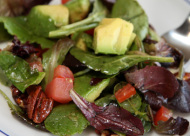Winter salad with pecans, pears and gorgonzola
- 15 ingredients
- Servings per recipe: 2
- Serving size: 360 g
Preparation & details:
www.davidlebovitz.com/2013/12/winter-salad-with-pecans-pears-and-gorgonzola/
Source: David Lebovitz
110 recipes on HappyForks
Amount per 100 g
- Energy (calories): 212 kcal 10%
- Protein: 3.31 g 6%
- Fat: 20.03 g Why gray? Help 41%
- Carbohydrates: 7.43 g 3%
Calorie breakdown
Help
- Protein: 5% 12 kcal
- Fat: 81% 173 kcal
- Carbohydrates: 13% 28 kcal
Omega 6 : Omega 3
Help
1:1 20:1 20:1
General
Energy
212 kcal
10%
Water
67.36 g
2%
Carbohydrates
Carbohydrate
7.43 g
3%
Fiber
3.4 g
14%
Sugars, total
3.26 g
Starch
0.07 g
Lipids
Total lipid (fat)
20.03 g
41%
Total polyunsaturated
3.973 g
Omega 3 (n-3)
0.185 g
13%
Omega 6 (n-6)
3.781 g
31%
Total monounsaturated
12.253 g
Total saturated
2.754 g
as low as possible
Total trans
0.066 g
as low as possible
Cholesterol
5 mg
as low as possible
Protein + aminoacids
Protein
3.31 g
6%
Tryptophan
0.016 g
5%
Threonine
0.068 g
5%
Isoleucine
0.081 g
7%
Leucine
0.132 g
5%
Lysine
0.073 g
3%
Methionine + Cystine
0.058 g
5%
Methionine
0.032 g
Cystine
0.026 g
Phenylalanine + Tyrosine
0.134 g
6%
Phenylalanine
0.085 g
Tyrosine
0.049 g
Valine
0.089 g
6%
Vitamins
Vitamin C
4.4 mg
6%
Folate, total
65 µg
Folate, DFE
65 µg DFE
16%
Vitamin B-1 (Thiamin)
0.132 mg
12%
Vitamin B-2 (Riboflavin)
0.07 mg
6%
Vitamin B-3 (Niacin)
0.378 mg
3%
Vitamin B-5 (Pantothenic acid)
0.539 mg
11%
Vitamin B-6
0.052 mg
4%
Vitamin B-12 (Cobalamin)
0.13 µg
5%
Vitamin A
1017 IU
44%
Vitamin E
2.85 mg
19%
Vitamin D
8 IU
1%
Vitamin K
102.6 µg
114%
Isoflavones, total
0 mg
Minerals
Calcium, Ca
79 mg
8%
Magnesium, Mg
27 mg
9%
Phosphorus, P
83 mg
12%
Iron, Fe
0.82 mg
5%
Potassium, K
231 mg
5%
Sodium, Na
297 mg
20%
Zinc, Zn
1.18 mg
15%
Copper, Cu
0.233 mg
26%
Selenium, Se
2.2 µg
4%
Manganese, Mn
0.826 mg
46%
Similar recipes
- Protein: 9%
- Fat: 49%
- Carbs: 42%
Endive salad with walnuts, pears, and gorgonzola
- 40 kcal
- 8 ingredients
Ingredients
| Ingredient description | Matched product |
|---|---|
| Salted pecans | |
| 1 cup (140g) pecans | Nuts · pecans - 1 cup, halves |
| 1 teaspoon olive oil | Oil · olive · salad or cooking - 1 tsp |
| 1/4 teaspoon flaky sea salt | Salt · table - 0.25 tsp |
| a few grind black pepper | Spices · pepper · black - 5 dash |
| Dressing | |
| 1 tablespoon white wine vinegar or sherry vinegar | Vinegar · red wine - 1 tbsp |
| 1/4 teaspoon salt | Salt · table - 0.25 tsp |
| small dab of Dijon mustard | Mustard · prepared · yellow - 0.5 tsp or 1 packet |
| 2 tablespoons olive oil | Oil · olive · salad or cooking - 2 tbsp |
| 2 tablespoons hazelnut or walnut oil | Oil · hazelnut - 2 tbsp |
| Salad | |
| 2 ounces (55g) gorgonzola cheese, at room temperature | Cheese · fresh · queso fresco - 55 g |
| 6 cups (150g) torn or chopped leaves of winter greens; any mixture of escarole, radicchio, watercress, Belgian endive, and frisée | Endive · raw - 6 cup, chopped |
| 1 ripe pear | Pears · raw - 1 medium |
| flaky sea salt | Salt · table - 3 dash |
| freshly ground black pepper | Spices · pepper · black - 2 dash |
| minced chives or parsley, for garnish | Chives · raw - 2 tbsp chopped |
Possible differences in nutritional values
All the nutritional values are calculated based on the above products from HappyForks. The precise nutritional values of your recipe may differ due to the use of some specific foods, which not always have a perfect fit in HappyForks. The ingredients used in the recipe may have also different nutritional values than those in our database.
About Nutrition Facts
- Symbol "~" means missing value.
- Percentages next to nutrients show the proportion of daily recommended intake level of nutrients for a healthy person, whose data are included in the nearby profile.
- Nutrition recommendations based on Dietary Reference Intake (DRI) developed by the Institute of Medicine, source.
Advanced mode
- RDA (Recommended Dietary Allowances) - the daily daietary intake level of a nutrient that meet the requirements of 97.5% of healthy individuals in particular age group and gender.
- AI (Adequate Intake) - recommended average daily nutrient intake assumed to be adequate based on approximation of observed mean nutrient intake by a group of healthy people, used when an RDA cannot be determined.
- UL (Tolerable upper intake levels) - the highest level of daily consumption that current data have shown to cause no side effects in humans when used indefinitely without medical supervision.





